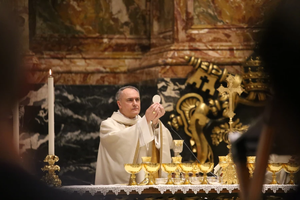Apparently, I’m ‘Too Catholic’ — and in the Eyes of the World, So Are You
Musings on being rejected for following Jesus ...

I have concluded, perhaps later that I should have, that so-called liberal Christianity is more of a danger than atheists to the future of our faith.
In the past month, I’ve run into two situations that have made this clear to me. Both incidents have caused me great personal pain but also forced me to reckon with a reality that Christian liberalism is more corrosive than I ever thought possible. I was told in one instance that my “values” did not fit with the mission of the institution. Essentially, my opposition to euthanasia was one of those values.
Atheists would seem like our greatest foe. They are the ones who drive to push religion out of the public square, go into spasms if they see “god” with a capital “G” in any government document, and blame religion for most of the world’s ills. They even see postings of the Ten Commandments in public schools as insidious indoctrination of the young.
But the thing about atheists is that they are honest. There’s no mealy-mouthed defence of their creed. They don’t hide who they are. They don’t water down their positions because non-atheists find them unpopular. I’ve even found over the years of covering religion that atheists can be easy to talk to because they are direct. Some of my most interesting conversations as a journalist were with atheists. I like people who say what they mean without equivocation.
To be clear, they are not on our side. They see religion as getting in the way of progress. They will foil many of our plans for a healthy society. But there’s no confusion. They are an army in a recognizable uniform.
But liberal Christianity is a whole other thing. They are on a non-stop popularity campaign to make sure they offend no one.
When these Christians see things that make them unpopular, they change. In Canada and elsewhere, I’ve seen some Protestant denominations support legalized euthanasia and abortion. They, along with liberal Catholics, take great pleasure marching in “gay-pride” parades.
They don’t have the confidence or the guts to defend orthodoxy because they can’t stand to be labeled as fanatics. When in doubt, they yield to the popular culture, essentially exchanging ancient, beautiful teachings in order to be the equivalent of the cool kid in school: Don’t worry, the Virgin Birth was just a metaphor. Jesus rose from the dead … spiritually. It’s ridiculous to believe a tiny wafer is the body and blood of Jesus. We’re about celebrating the rainbow of views and lifestyles. Pre-pubescent children can decide themselves what gender they would like to be.
So, what happened to me? First, I don’t want to mention the names of the institutions because, despite some serious flaws, they do good work. You’ll have to trust me that they really exist.
I have a lot of experience as a volunteer. I worked for years at out-of-the-cold programs, hospices and palliative wards. I also helped with several RCIA programs. To work in palliative wards and hospices, I took two intensive courses. I loved the work. I felt and will always feel that the last days of life are still a life to be cherished. It was an absolute honor to accompany such people, especially in a country where far too many turn to government-sponsored suicide.
It came as a shock to me that I was told by two places I hoped to volunteer and which I had worked at before, my “values” no longer fit with the missions of those institutions. One, I should add, was Catholic.
Far as I could tell, I was too dead set against euthanasia and essentially too Catholic. Those values are no longer wanted in some circles.
When I dealt with Catholic patients, I never lectured about euthanasia. If someone said they were interested in assisted suicide, I would let a priest know so he could counsel them about the dignity of life and a natural death.
What I tried to do was love each patient and find ways to make them happy, even laugh. I would never enter the room of a patient to talk about euthanasia. Rather, I would listen or pray with them and try to bring a bit of light to their lives.
These rejections may not seem like big deals, but, to me, they are indicative of the rot growing not just in Protestant churches but even in our own Catholic Church. Once, I asked to speak about the evils of assisted suicide at a local parish. The priest’s response was that I might offend his liberal parishioners.
Years ago, then-Cardinal Joseph Ratzinger (later Pope Benedict XVI), wrote in a slim volume of essays called Faith and the Future about how the Church might shrink to a more faithful few. This is what he wrote:
But in all of the changes at which one might guess, the Church will find her essence afresh and with full conviction in that which was always at her center: faith in the triune God, in Jesus Christ, the Son of God made man, in the presence of the Spirit till the end of the world.”
In other words, Christians should forget about being popular. Christians should no longer adopt the latest faddish ideas over the eternal truth of orthodoxy. Fads last but a moment, but they can do irreparable harm while they last — whereas orthodoxy is the gate to the truth … to salvation.
- Keywords:
- anti-catholicism
- euthanasia
- othodoxy
- faithfulness

















